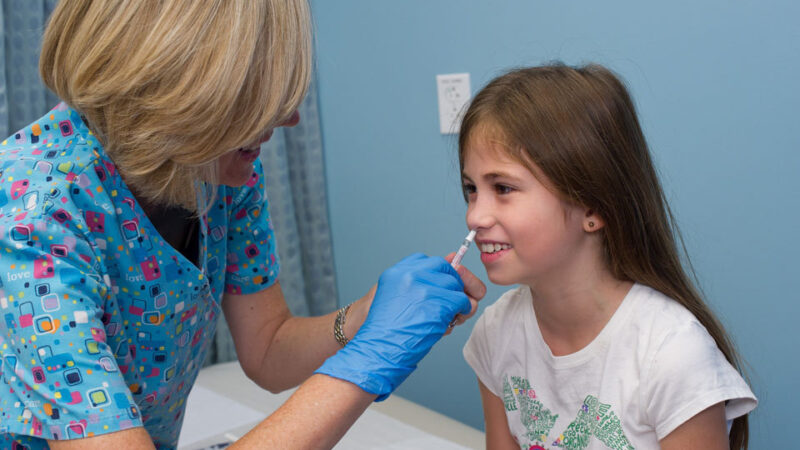
The children’s flu vaccine helps protect against flu. It’s offered to children aged 2 to 3 years, school-aged children (Reception to Year 11) and children with certain long-term health conditions.
This page is about the flu vaccine for children. There’s separate information about the flu vaccine for adults and flu vaccine in pregnancy.
Why children are offered the flu vaccine
Flu can be very unpleasant for children and can sometimes cause serious problems, such as pneumonia.
Each winter in the UK, thousands of children who do not have a health condition need hospital care because of flu.
Children can catch and spread flu easily. Vaccinating them also helps protect others who are at higher risk of getting seriously ill from flu, such as babies and older people.
The children’s flu vaccine is usually given as a quick and painless nasal spray in each nostril.
Children who cannot have the nasal spray vaccine will get a different flu vaccine, given as an injection into the upper arm or thigh.
Some children with certain long-term health conditions who have not had a flu vaccine before might need to have a 2nd dose 4 weeks later.
Children can get the flu vaccine at the same time as other vaccines.
Find out more about why vaccinations are important and the safest way to protect yourself
Who should have the children’s flu vaccine
The children’s flu vaccine is offered on the NHS every year in autumn or early winter.
It’s recommended for:
- children aged 2 or 3 years
- school-aged children (Reception to Year 11)
- children aged 6 months to 17 years with certain long-term health conditions
How to get the children’s flu vaccine
Children aged 2 or 3 years
Children who are aged 2 or 3 years on 31 August 2025 (born between 1 September 2020 and 31 August 2023) will get the flu vaccine at their GP surgery.
You should get an invitation from your GP surgery, or be able to contact them, in autumn or early winter to book an appointment.
School-aged children (Reception to Year 11)
Most school-aged children (Reception to Year 11) get their flu vaccine at school.
You should get an invitation from your child’s school to get their vaccine, usually during the autumn term.
If your child misses their vaccination at school or if they are home-schooled, they should be offered a flu vaccine at a community clinic.
If your child is 4 years old but has not started school yet, they can get vaccinated at either:
- their GP surgery – if they turned 4 years of age after 31 August 2024
- a community clinic – if they turned 4 years of age on or before 31 August 2024
Children with certain long-term conditions
Children with certain long-term health conditions that put them at higher risk from flu can get a flu vaccine from their:
- school (if they’re in Reception to Year 11)
- GP surgery
If your child is in Reception to Year 11, they should get an invitation from their school to have the vaccine, usually during the autumn term.
If your child is not in school or you want to vaccinate your child earlier than when it’s offered at school, contact their GP surgery in autumn or early winter to book an appointment.
Video: Vaccines for your child
Vaccinations are safe and effective. In this video, NHS paediatricians Dr Kiran Rahim explains why you should get your child vaccinated.
Video: Vaccines – are they safe for my child?
In this video, a GP reassures a parent about vaccinations and the unfounded risks associated with them.